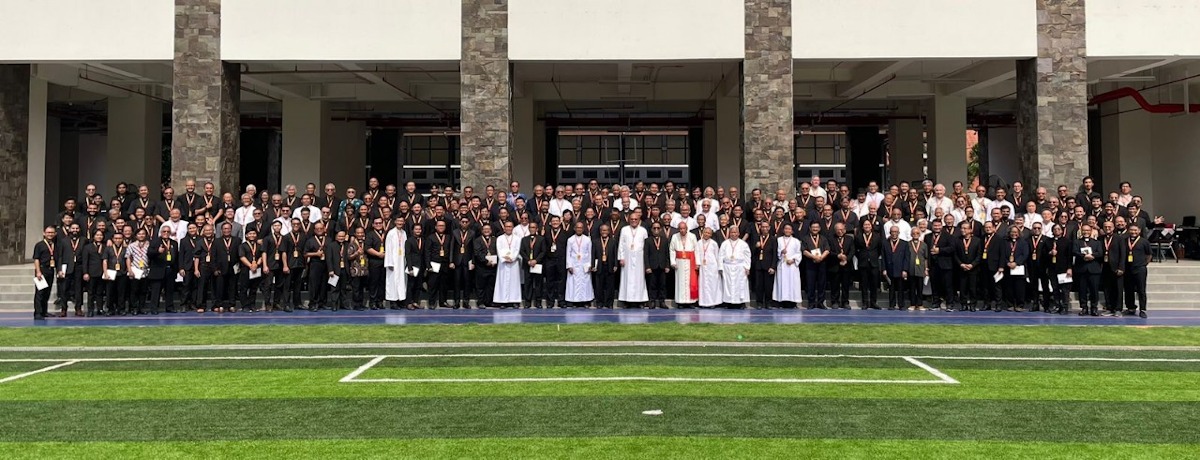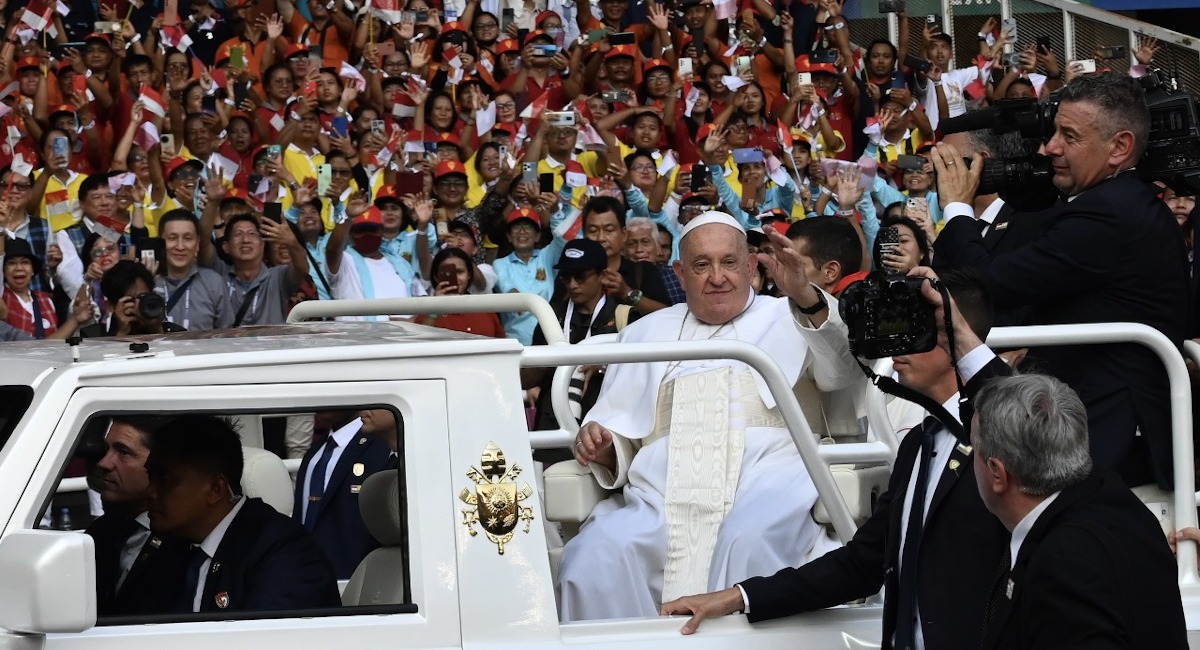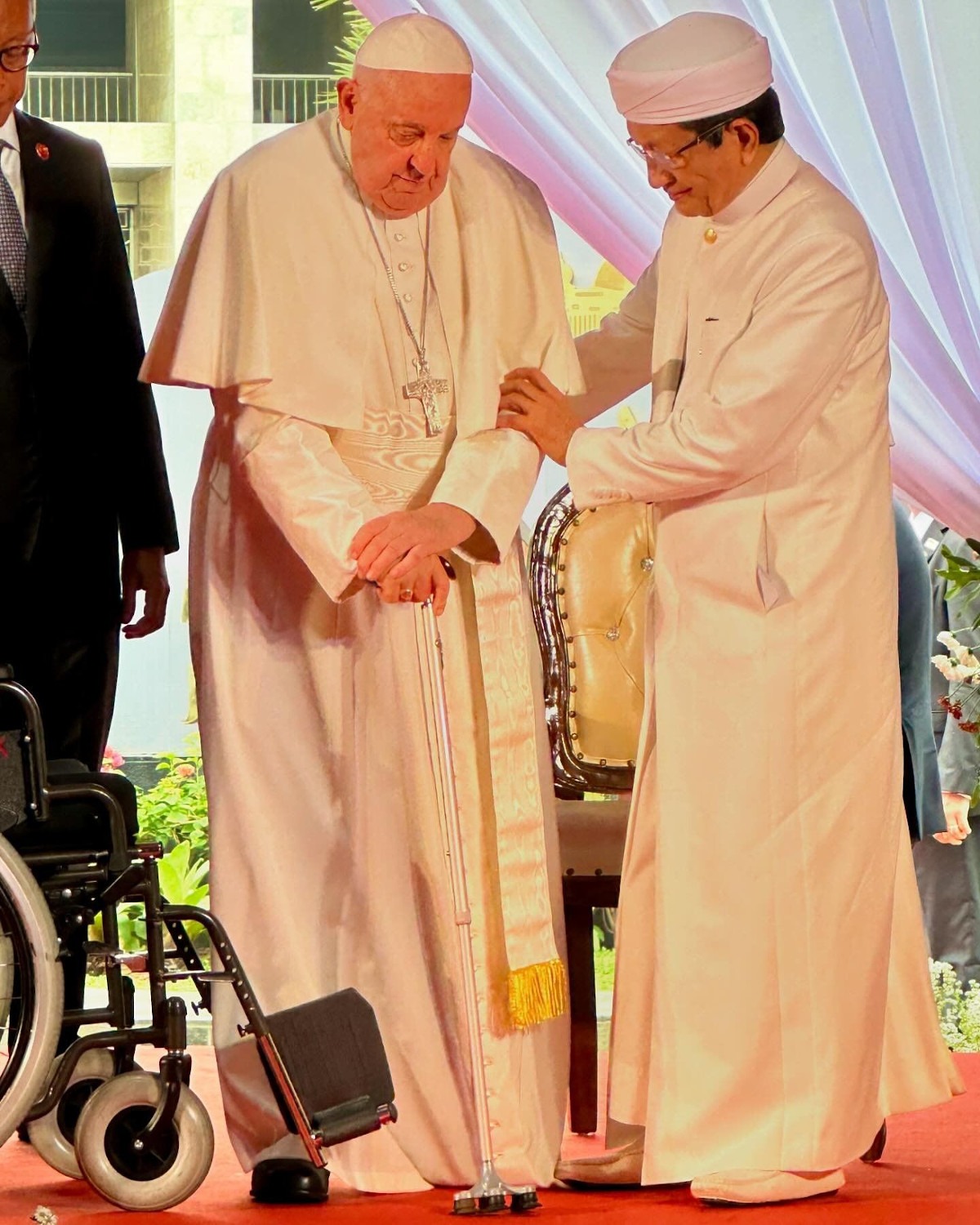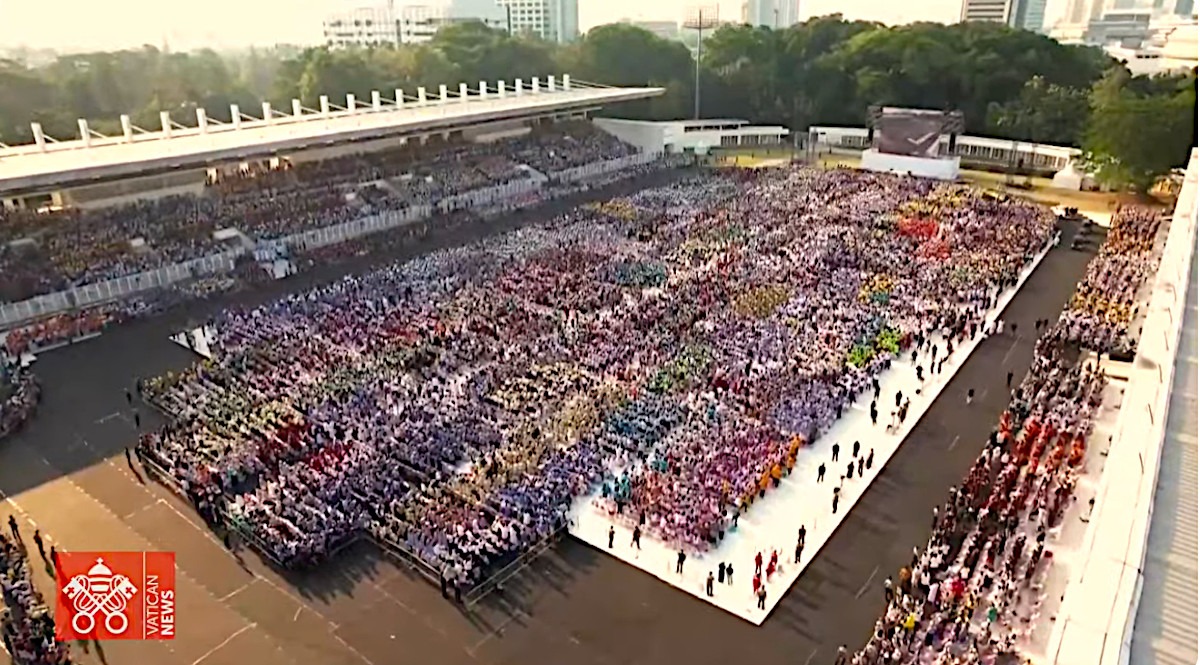
Pope Francis inaugurated his sixth apostolic journey to Asia with a visit to Indonesia, the world’s most populous Muslim nation. For the Jesuits working in the country, the Holy Father’s trip reaffirmed the Society’s commitment to interfaith dialogue, youth, social justice, and care for our common home.
After a 13-hour flight from Rome, Pope Francis arrived in Jakarta on 3 September. Among the first people to greet him were migrants and refugees, orphans, the elderly, and the sick, who gathered at the apostolic nunciature where the Pope stayed while in Indonesia.
“Even in his very first engagement, the Pope greeted people on the existential peripheries,” said Fr Martinus Dam Febrianto SJ, Jesuit Refugee Service (JRS) Indonesia country director. The meeting was proposed by JRS through Mgr Piero Pioppo, the Apostolic Nuncio to Indonesia, and therefore was not included in the official agenda set by the Indonesian committee for the papal visit.
“The Pope consistently pays special attention to the poor, the abandoned, refugees, migrants at risk, and victims of human trafficking,” noted Fr Febrianto. “This was a highly symbolic gesture of his preferential option for marginalised communities, aimed at encouraging people and authorities to focus on those in need.”

On the second day, Pope Francis held his customary encounter with the local Jesuits at the apostolic nunciature, following his meeting with Indonesian authorities, civil society, and diplomatic corps at the presidential palace. The Pope spent about an hour speaking privately with his Jesuit brothers, addressing important themes, such as discernment, prayer, interreligious dialogue, and inculturation.
However, one of the things that surprised and delighted the Holy Father was seeing so many young Jesuits in formation. Scholastic Isaac Jacques Cavin SJ, a second year theology student, remarked on the humour and warmth of the Pope’s interaction with them.
“Pope Francis has a very nice sense of humour. Before anyone else spoke, I had the first opportunity to ask a question. I was very nervous and didn’t know whether the meeting would be formal or casual. I asked for the Pope’s advice for young Jesuits in accompanying excluded people (orphans, refugees, and marginalised people). When I finished my question, my gesture was very polite, and I held my hands very tightly,” Cavin shared.
He continued, “But the Pope did not answer immediately; instead, he made humour of my overly polite attitude. He said, ‘Jesuits who are too polite and pious with their hands clasped like that are not of much use. Jesuits should do something extraordinary; go to the frontier.’ Immediately all Jesuits were laughing at my joking around with the Pope. This is a typical situation whenever Jesuits gather, which is very warm, close, and humourous.”
Among the youngest attendees at the private meeting was Scholastic Albert Aryasatya Ray Raja SJ, who is in first year philosophy. He noted the Pope’s “brilliant” and “entertaining” responses to difficult questions, adding that the encounter reinforced his vocation.
“When I had the opportunity to shake hands with the Holy Father, I planned what kind of greeting I wanted, but when I was in front of him, I felt nervous and forgot everything I had planned. What I remember most clearly now is the sincere smile he gave in every answer and meeting. This meeting strengthened my vocation because in his meeting I felt accompanied in living my vocation in its ease and vulnerability through the answers he gave us.”

The central focus of the visit was interreligious dialogue. Catholics in the country make up just 3 percent of the population, numbering around 8 million, compared with the 87 percent, or 242 million, who are Muslim. The other recognised religions or denominations are Protestantism, Buddhism, Hinduism, and Confucianism. Indonesia is often cited as a model of successful interreligious harmony and collaboration, but not without challenges from rising intolerance and radical fundamentalism.
On 5 September, the Pope met with leaders of all six recognised religions in Indonesia at the Istiqlal Mosque. Together with the Grand Imam of Istiqlal, Nasaruddin Umar, Pope Francis signed the Joint Declaration of Istiqlal 2024: Fostering Religious Harmony for the Sake of Humanity. The declaration addresses both the “dehumanisation” of conflict and environmental issues—underscoring the ethical responsibilities of religious communities. “The values shared by our religious traditions should be effectively promoted in order to defeat the culture of violence and indifference afflicting our world,” the statement noted.
Fr Ignatius Ismartono SJ, who watched the ceremony via livestream, said he couldn’t help but be moved by the show of human fraternity and unity in diversity (Indonesia’s national motto) that he witnessed.
“In the same time and space, the Quran and the Gospel were read and listened to by the same audience. May we also do together in daily life,” he shared.
This gesture of interfaith harmony was further emphasised when Pope Francis and the Grand Imam together visited the “Tunnel of Friendship,” which connects Istiqlal Mosque, the largest in Southeast Asia, to Jakarta’s main cathedral, the Cathedral of Saint Mary of the Assumption. Built in 2020, the tunnel is a symbol of religious harmony.
“This is an eloquent sign, allowing these two great places of worship not only to be ‘in front’ of each other, but also ‘connected’ to each other,” said Pope Francis in his address. “Indeed, this passageway allows for encounter, dialogue, and a real possibility for ‘finding and sharing a mystique’ of living together, mingling, and encounter.”

Fr Greg Soetomo SJ, Coordinator for Dialogue with Islam of the Jesuit Conference of Asia Pacific, highlighted how the Pope’s teachings resonate deeply with the official state philosophy of Pancasila, particularly in promoting unity, social justice, and religious tolerance.
Pope Francis concluded his third and final day in Indonesia with a Mass at the Gelora Bung Karno Stadium, where over 100,000 people attended. He urged the Indonesian faithful to continue building a society rooted in peace and dialogue. “I encourage you to sow seeds of love, confidently tread the path of dialogue, continue to show your goodness and kindness… and be builders of unity and peace.”
The local Jesuits have been greatly inspired and challenged by Pope Francis’ visit. “Pope Francis emphasises the importance of dialogue between cultures and religions, encouraging us to build bridges rather than walls,” Fr Ismartono remarked.
Fr Febrianto, who has written about Pope Francis, reflected on the impact of his advocacy for marginalised communities. “The Pope’s gestures, ideas, and actions, from addressing the plight of migrants and refugees to confronting global inequality and environmental challenges, have inspired me deeply. I hope his messages are embraced by the public for the sake of a better world,” he said.
Related stories:
Pope Francis in Indonesia, Timor-Leste, and Singapore
Hopes and insights from the Holy Father’s upcoming trip to Asia Pacific

